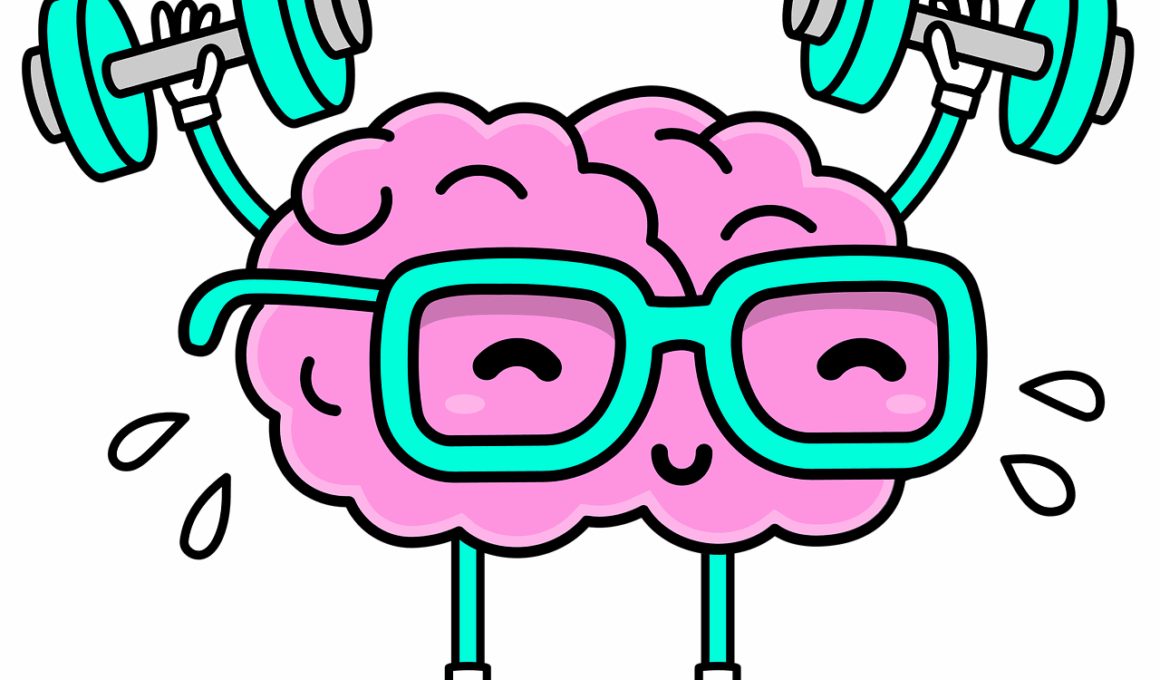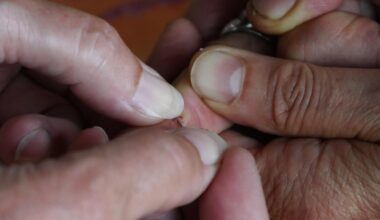Techniques for Maintaining Motivation During Off-Season Training
Off-season training for triathletes can be challenging, especially when motivation dips. Understanding how the mind influences motivation is vital. Setting concrete goals can provide direction. Goals may be long-term or short-term, but they should be specific, measurable, achievable, relevant, and time-bound (SMART). For instance, if an athlete aims to improve overall fitness, a short-term goal might be running three times a week. Keep these goals visible and regularly check progress. Another essential technique is visualization, where athletes imagine successfully completing their goals and the sensations felt during that accomplishment. This reinforces belief in one’s capabilities and increases motivation. Incorporating diversity in training routines can keep things exciting. Cross-training can help break monotony while providing different challenges. Listen to your body’s needs, adjusting intensity as necessary. Moreover, keeping a training diary helps monitor progress while also providing a sense of achievement, enabling athletes to reflect on successes. Engaging with like-minded individuals through clubs or online forums can create accountability and motivation. Lastly, celebrate small victories at every stage of your off-season training to foster a sense of achievement that can sustain motivation.
Maintaining a positive mindset through off-season training is crucial. Mindfulness techniques, such as meditation, can help athletes stay present and focused. Practicing mindfulness assists in reducing anxiety related to training differences and performance pressures. In addition, excitement about the upcoming season can rejuvenate motivation during down times. Athletes should consider creating a vision board that captures their off-season training goals, aspirations, and inspiration from successful athletes. This visually reminds them of why they train and what they aim to achieve. Engaging with professional sports psychology resources can provide deeper insights into self-motivation techniques. In this regard, reading books or watching motivational talks can plant the seeds of inspiration. Regularly reviewing one’s training plan can also spark motivation. The off-season is an excellent time to evaluate past performances, identify strengths and weaknesses, acknowledge successes, and tailor training regimens accordingly. Another effective strategy is to establish a routine that incorporates enjoyable activities, contributing to a holistic approach to training. Remember, enjoyment in physical activities correlates strongly with motivation levels. Integrating fun and play into workouts ensures sustained interest and engagement with triathlon training.
Social Support and Motivation
Another vital factor for maintaining motivation during the off-season is social support. Connecting with others who share similar goals creates a motivating environment. Joining a local triathlon club, participating in training groups, or even enlisting friends to exercise can significantly uplift morale. Sharing experiences and progress, no matter how small, builds a sense of community. You can encourage each other through a dedicated chat group where achievements are shared, motivating everyone involved. Also, engaging in partner training sessions can help keep you accountable. When others depend on you to show up, it provides an extra boost to motivation. Triathletes can also consider collaborating with a coach or mentor who encourages and challenges them to exceed expectations. Regular check-ins with such mentors can help evaluate progress, recalibrate goals, and offer valuable feedback to improve. Informal gatherings, like group runs or swim sessions, combine training with friendship, making workouts enjoyable while fostering camaraderie. Social connections with others can serve as both a motivational tool and a source of valuable advice on overcoming challenges faced during the off-season. It’s essential to leverage this social aspect for optimal training results.
Maintaining a healthy balance between training and recovery is essential for sustained motivation. Triathletes must remember that downtime is not an indication of weakness. Proper rest is vital to physical and mental recovery, preventing burnout. Scheduled rest days within the training regime allow the body to heal and rebuild while also providing mental breaks to recharge. During these breaks, consider engaging in cross-training activities or lighter exercises like yoga to maintain movement without excessive strain. This relaxation period assists in preventing injury while also rekindling excitement for training. Incorporating self-care routines can further enhance well-being. Activities such as pampering oneself with massages, proper nutrition, and hydration can lead to greater overall satisfaction with training. These self-care measures demonstrate commitment to oneself, reinforcing motivation to continue striving for goals. Adequate sleep is another crucial aspect for athletes during the off-season. Good sleep hygiene can significantly impact energy levels and mental resilience. When athletes feel refreshed and energized, motivation naturally improves, driving better training outcomes.
Setting Up Mini-Competitions
Creating mini-competitions with friends or fellow athletes is another excellent technique to keep motivation alive. These friendly rivalries can add fun while providing incentives to push beyond their limits. Organizing small events, such as time trials or swim challenges, can simulate the excitement of race day and reinforce commitment. The competitive aspect temporarily alleviates the boredom often encountered in off-season training. Posting results on social media platforms can offer additional motivation and accountability. Athletes often draw inspiration from followers’ encouragement, making them feel more connected and engaged. It’s critical to focus on personal growth, choosing challenges that stimulate skill improvement while promoting enjoyment. With a shift toward a growth-centric mindset, the emphasis remains on continual self-improvement rather than merely winning. Additionally, emphasizing effort and dedication over victory helps build resilience, fostering long-term interest in training and participation in future competitions. Utilizing running apps or fitness trackers to document progress can enhance the competitive aspect, promoting motivation through visible achievements. In this way, incorporating competitions aids in sustaining engagement during the off-season by actively participating in a range of stimulating activities.
Establishing an off-season routine enriched with variety is invaluable for maintaining motivation. Integrating diverse workouts helps to alleviate monotony while developing different muscle groups necessary for triathlon success. This balance prevents overuse injuries and enhances overall fitness. Consider adding strength training, swimming drills, cycling sessions, or even outdoor activities like hiking. Triathletes can also experiment with different sport modalities to boost overall fitness. The introduction of dynamic challenges, such as obstacle races or trail running, provides excitement and new learning opportunities. Seeking inspiration from various training methodologies can enhance existing routines. Exploring new techniques can provide both mental and physical revitalization, contributing positively to motivation levels. Rotating through different disciplines keeps training sessions fresh and engaging, which is crucial for long-term commitment. Intentional breaks to try different sports can also allow triathletes to share their experiences with others. This engagement fuels motivation, as the added experiences help create rich narratives that participants can share with fellow athletes. Furthermore, exploring enjoyable fitness alternatives broadens the athlete’s interests beyond just triathlon, making the sport a cornerstone of a broader lifestyle.
Reflective Practices
Incorporating reflective practices during the off-season also aids in building lasting motivation. Regularly evaluating personal strengths and weaknesses can help athletes remain focused and inspired as they progress. Engaging in self-assessment allows triathletes to identify improvement areas while celebrating achievements. Those reflections should be documented in a training journal, which serves as a motivational tool and chronicler of progress. Reviewing this journal periodically can visualize how far one has come and re-establish overarching goals. Setting time aside for reflection also opens the door for introspection into one’s emotional states during training. Identifying triggers for motivation loss equips athletes with strategies to mitigate such experiences in the future. This practice also helps in acknowledging personal journeys, promoting self-compassion. Instead of harsh self-criticism during challenging periods, respectful acceptance fosters resilience and long-term commitment. Furthermore, discussing experiences with others instills a sense of shared journey, enhancing communal support. Lastly, incorporating mindfulness meditation practices can promote greater awareness of thoughts and feelings around training, again contributing to enhanced motivation during the demanding off-season.
Conclusion: Emphasizing Growth
In conclusion, maintaining motivation during off-season training requires various strategies. Emphasizing growth over immediate results helps triathletes cultivate an enduring passion for their sport. Establishing a routine, integrating variety, engaging social support, and incorporating reflective practices contribute significantly to the training experience. With diligence, athletes can learn to navigate off-seasons more effectively, fostering emotional resilience and a deeper connection to their training. By setting realistic goals, practicing mindfulness, and celebrating progress, athletes can turn challenging periods into opportunities for self-discovery. Each off-season provides valuable insights and has the potential to deepen one’s relationship with the sport of triathlon. Remember, the journey itself is just as important as the destination. Engaging fully in the off-season not only primes the body for the next competitive season but also nurtures the athlete’s spirit. Long-term motivation is rooted in the enjoyment of the process rather than solely the pursuit of accolades. Remaining patient, adaptable, and open to growth will ultimately yield more rewarding experiences within triathlon training and beyond.


